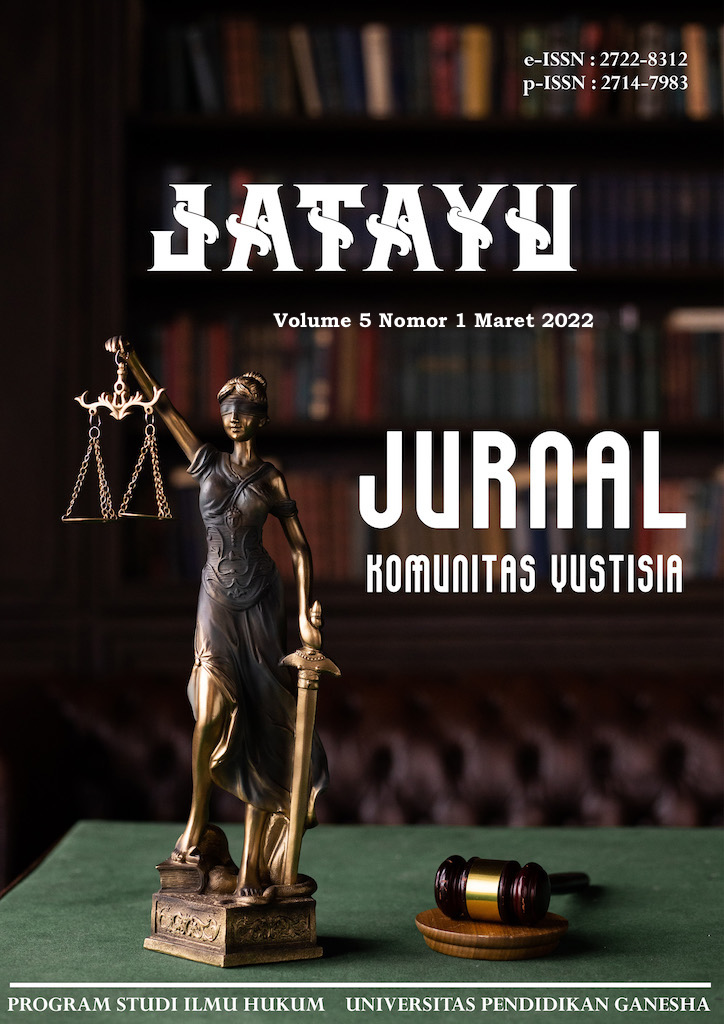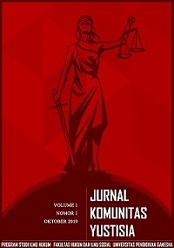PERAN PROPAM DALAM PENEGAKAN KODE ETIK KEPOLISIAN REPUBLIK INDONESIA BERDASARKAN KETENTUAN PASAL 17 PERATURAN KEPALA KEPOLISIAN NEGARA REPUBLIK INDONESIA NOMOR 14 TAHUN 2011 TENTANG KODE ETIK PROFESI KEPOLISIAN NEGARA REPUBLIK INDONESIA DI KEPOLISIAN RESO
DOI:
https://doi.org/10.23887/jatayu.v5i2.51674Keywords:
pelanggaran kode etik, propam, penegakan hukumAbstract
Penelitian ini bertujuan untuk (1) mengkaji dan menganalisis sehingga menghasilkan pengetahuan tentang Peran Propam dalam penegakan Kode Etik Kepolisian Republik Indonesia berdasarkan Pasal 17 Perkap Nomor 14 Tahun 2011 Tentang Kode Etik Profesi Kepolisian Negara Republik Indonesia di Kepolisian Resor Buleleng (2) mengkaji dan menganalisi sehingga menghasilkan pengetahuan tentang bagaimana akibat hukum serta rehabilitasi yang di berikan terhadap anggota Polri yang melakukan Pelanggaran Kode Etik di Kepolisian Resor Buleleng. Adapun jenis penelitian yang digunakan adalah penelitian hukum empiris, dengan sifat penelitian deskriptif dengan lokasi penelitian dilaksanakan di Polres Buleleng. Teknik pengumpulan data yang digunakan adalah dengan studi dokumen, observasi, dan wawancar. Teknik penentuan sampel yang digunakan adalah teknik Non Probability Sampling dan penentuan subjeknya menggunakan teknik Purposive Sampling. Teknik pengolahan dan analisis data secara kualitatif. Hasil penelitian menunjukkan bahwa (1) penegakan kode etik berdasarkan dasar hukum, semua peraturan yang dijalankan Propam baik dalam pengawasan, pelayanan, dan menindak anggota yang melakukan pelanggaran/ bermasalah semua harus berdasarkan hukum. (2) Proses dalam pengawasan pelaksanaan putusan rehabilitasi personel terdapat di Unit Paminal (Pengamanan Internal) yang akan merekomendasikan ke Polda oleh Propam dan Paminal.
Downloads
Published
Issue
Section
License

This work is licensed under a Creative Commons Attribution-ShareAlike 4.0 International License.
Authors who publish with this journal agree to the following terms: Authors retain copyright and grant the journal right of first publication with the work simultaneously licensed under a Creative Commons Attribution License that allows others to share the work with an acknowledgement of the work's authorship and initial publication in this journal. Authors are able to enter into separate, additional contractual arrangements for the non-exclusive distribution of the journal's published version of the work (e.g., post it to an institutional repository or publish it in a book), with an acknowledgement of its initial publication in this journal. Authors are permitted and encouraged to post their work online (e.g., in institutional repositories or on their website) prior to and during the submission process, as it can lead to productive exchanges, as well as earlier and greater citation of published work (See The Effect of Open Access). Authors who publish with this journal agree to the following terms: Authors retain copyright and grant the journal right of first publication, with the work [SPECIFY PERIOD OF TIME] after publication simultaneously licensed under aCreative Commons Attribution License that allows others to share the work with an acknowledgement of the work's authorship and initial publication in this journal. Authors are able to enter into separate, additional contractual arrangements for the non-exclusive distribution of the journal's published version of the work (e.g., post it to an institutional repository or publish it in a book), with an acknowledgement of its initial publication in this journal. Authors are permitted and encouraged to post their work online (e.g., in institutional repositories or on their website) prior to and during the submission process, as it can lead to productive exchanges, as well as earlier and greater citation of published work (See The Effect of Open Access).






